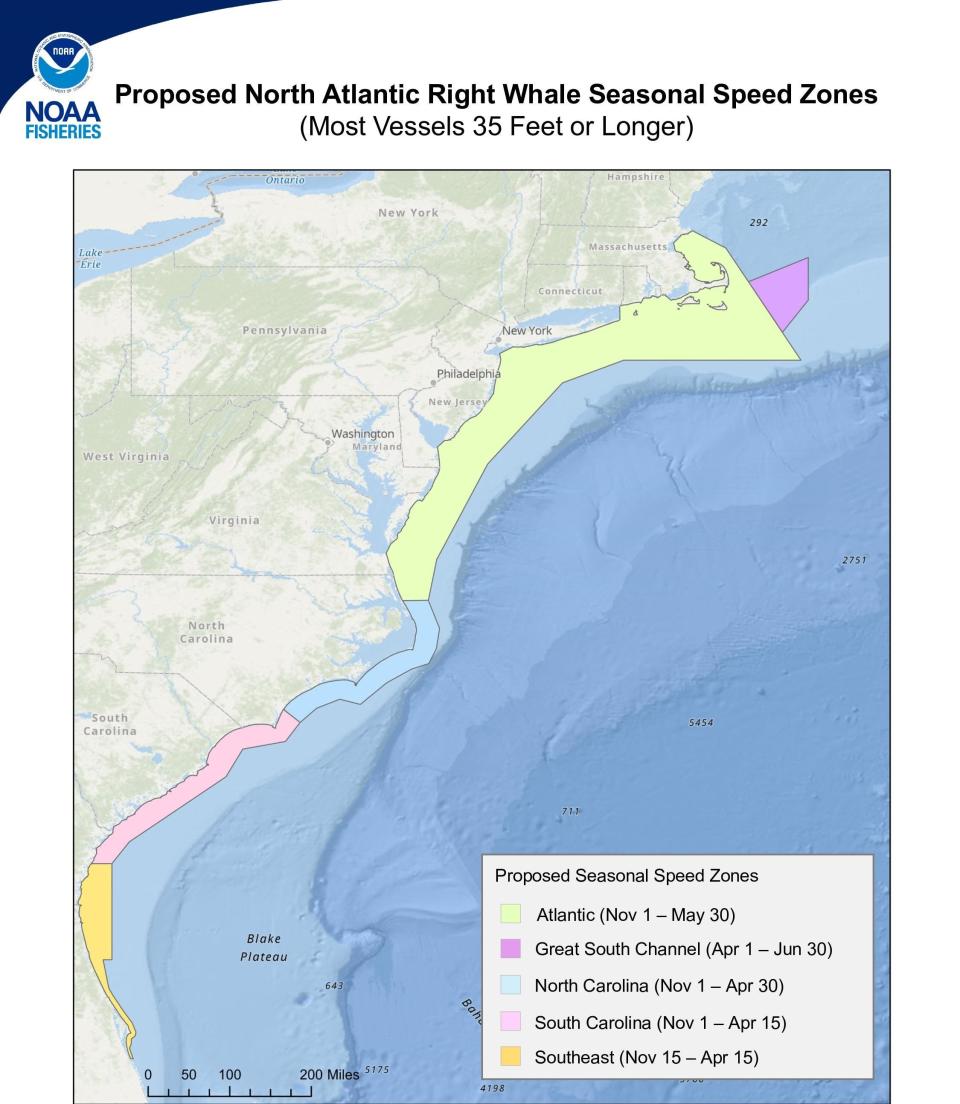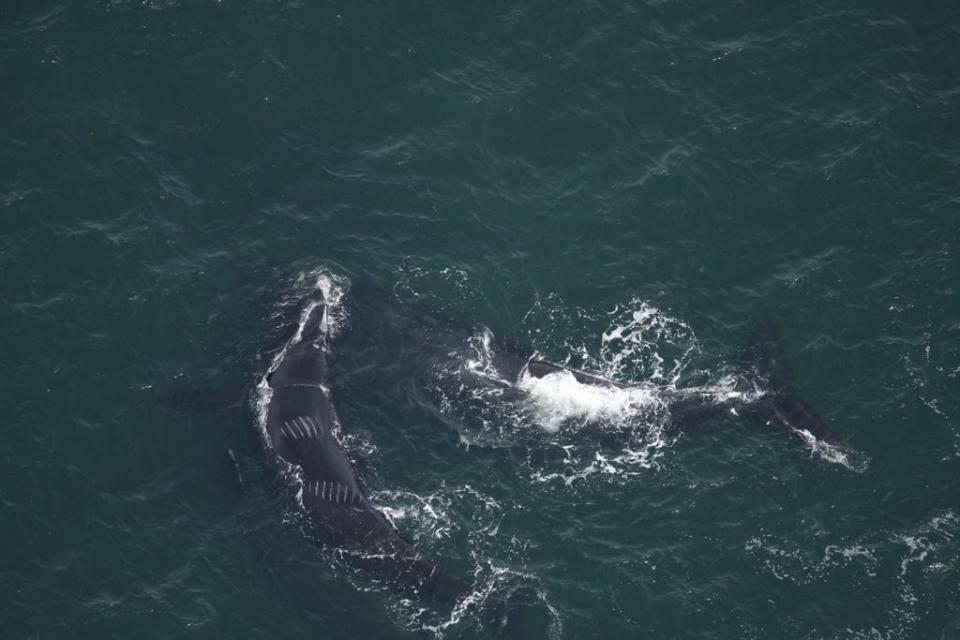Feds delay decision on small boat speed limit rule that could help endangered right whales
Environmentalists and fishermen up and down the East Coast, including in North Carolina, are still waiting to hear if federal regulators will order boats as small as 35 feet to hit the brakes during certain times of the year to help protect the highly endangered North Atlantic right whale.
Officials with the National Oceanic Atmospheric Administration (NOAA) had repeatedly said to expect a decision by the end of 2023, but none was issued as the calendar turned to 2024. A message sent to the federal agency this week wasn't immediately returned, but in late November Bloomberg Law reported that NOAA had decided to delay a decision until the new year. That prompted a positive response from the National Marine Manufacturers Association.
“This harmful proposal has the potential to significantly impact boater safety and coastal economies across the Eastern Seaboard," said Frank Hugelmeyer, the association's president, in a statement. "We will continue to engage NOAA to find a balanced solution that protects the North Atlantic right whale without jeopardizing small businesses and the livelihoods of hardworking Americans.”
For more than a decade, NOAA has had seasonal-management areas, or SMAs, to limit the speed of most vessels 65 feet or longer to 10 knots, about 11.5 mph, in areas known to have heavy ship traffic that are also migratory routes or known calving grounds for the right whales. The North Atlantic Right Whale Consortium, a group of public and private groups dedicated to the conservation and recovery of the right whale, in late October said new data showed the whale's population at 356 individuals, down from an estimated 483 animals as recently as 2010. Although hunting of the right whales, so named because they swam close to shore and floated when dead, making them easy to kill and drag ashore for processing, has been outlawed for nearly a century, vessel strikes, fishing gear entanglements and the whales' slow reproductive levels remain major threats to the species' survival.
The existing go-slow zones, which run from November through April, extend about 20 nautical miles, or 23 miles, offshore and include areas around Morehead City and Beaufort and within 23 miles from shore between Wilmington and Brunswick, Ga. While mandatory for larger vessels, the rules are voluntary for those boats under 65 feet.
But a study by the marine environmental group Oceana looking at boat speeds from November 2020 through July 2022 found that 85% of vessels sped through the mandatory slow zone running from Wilmington to north Georgia. The average was 84% for SMAs in general. The numbers were much the same for speeding vessels in voluntary slow zones, where NOAA alerts boats outside of SMAs if right whales are spotted or detected with acoustics. There, Oceana found 82% of boats sped.

MIXING WIND AND WHALES: For highly endangered North Atlantic right whales, offshore wind brings a lot of unknowns
WHALE WOES: Day after baby whale found dead in NC port, entangled right whale seen off the Outer Banks
According to federal data, 12 of 36 documented right whale deaths between 2017 and 2023 were due to vessel strikes. That was the most deadly known cause.
With ship strikes, including from small boats, continuing to impact the whales' numbers even with the existing rules, environmentalists have been pushing for additional protections for the highly endangered animals. Federal regulators agreed, and NOAA floated the expanded go-slow rules in 2022.
Putting industry in peril?
But the draft rule has generated heated and vocal opposition from charter boat fishermen, local officials and even some politicians in Washington, including U.S. Rep. David Rouzer, R-N.C., who represents Southeastern North Carolina. They worry the move would wreck coastal economies already struggling with increased regulations and bureaucratic red tape, natural disasters heightened by climate change, and a slowing economy.
Charter boat and fishing captains fear the proposals could decimate their business. Although not the height of the summer tourism season along the North Carolina coast, the spring and fall "shoulder" seasons still generate plenty of business from visiting fishermen for area boat captains, hotels, tackle shops and restaurants.
According to a report by the American Sportfishing Association released in May 2022, the recreational fishing industry in North Carolina supports 455,000 jobs and generates $152 in economic impact for every pound of fish landed.
All in all, NOAA officials said they've received more than 90,000 public comments on the proposed rule change.
CHASING THE NEXT CATCH: Hook, line and sinking: What's the future of NC's commercial fishing industry?

We have babies!
Even with the deck increasingly looking stacked against the whales, including increased concern − albeit unproven so far − that offshore wind farms could prove another hazard for the right whales, there is some positive news.
Researchers have recorded eight new calves this winter breeding season, which runs roughly through March, off Florida, Georgia and South Carolina.
But the good news did come with an important caveat.
"While every right whale birth is a reason to celebrate, this number is far below what is needed to sustain this critically endangered species," officials with the New England Aquarium said in a release.

Reporter Gareth McGrath can be reached at GMcGrath@Gannett.com or @GarethMcGrathSN on X/Twitter. This story was produced with financial support from Green South Foundation and the Prentice Foundation. The USA TODAY Network maintains full editorial control of the work.
This article originally appeared on Wilmington StarNews: NOAA delays decision on boat speeds that could help endangered whales

